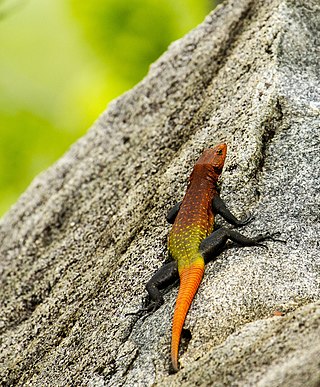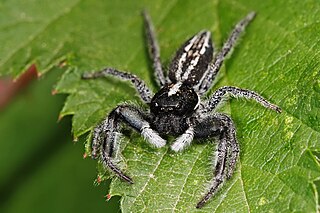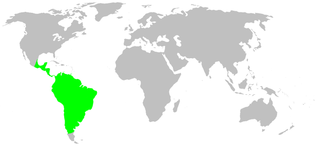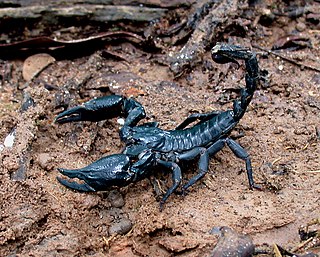
The Thomisidae are a family of spiders, including about 170 genera and over 2,100 species. The common name crab spider is often linked to species in this family, but is also applied loosely to many other families of spiders. Many members of this family are also known as flower spiders or flower crab spiders.

The family Cyrtaucheniidae, known as wafer-lid trapdoor spiders, are a widespread family of Mygalomorphae spiders.

Platysaurus is a genus of lizards, commonly known as flat lizards for their flat backs, in the family Cordylidae.

Pirate spiders, members of the family Mimetidae, are araneomorph spiders which typically feed on other spiders.

Myrmarachne is a genus of ant-mimicking jumping spiders that was first described by W. S. MacLeay in 1839. They are commonly called ant-mimicking spiders, but they are not the only spiders that have this attribute. The name is a combination of Ancient Greek μύρμηξ, meaning "ant", and ἀράχνη, meaning "spider".

Clynotis is a genus of spiders in the family Salticidae, or jumping spiders, contained within the subfamily Marpissinae. They are found across Australia and New Zealand, with some species occupying the Auckland Islands and one found exclusively on Snares Island. There are eight species currently described within the genus, the earliest noted being the type species Clynotis severus, first described in Queensland, New South Wales, Australia in 1879 by Ludwig Carl Christian Koch. The most recent was described in 1931 by Lucien Berland. Two other species previously held within the genus were subsequently reclassified into the genus Tara.

Ocrisiona is a genus of jumping spiders that was first described by Eugène Louis Simon in 1901. O. frenata from Hong Kong belongs to a different, unspecified genus, according to Marek Żabka (1990). Eugene Simon places the genus Ocrisiona close to Holoplatys.

Simaethula is a genus of Australian jumping spiders that was first described by Eugène Louis Simon in 1902. The name is an alteration of Simaetha, a related genus.

Dyspnoi is a suborder of harvestmen, currently comprising 43 extant genera and 356 extant species, although more species are expected to be described in the future. The eight families are currently grouped into three superfamilies: the Acropsopilionoidea, Ischyropsalidioidea, and Troguloidea.

The Sclerosomatidae are a family of harvestmen with about 1,300 known species. One former subfamily has been recently removed to form a new family, Globipedidae.
The Stygnidae are a family of neotropical harvestmen within the suborder Laniatores.

The Cladonychiidae are a small family of harvestman with about 33 described species, within the suborder Laniatores.

Tarantulas comprise a group of large and often hairy spiders of the family Theraphosidae. As of December 2023, 1,100 species have been identified, with 166 genera. The term "tarantula" is usually used to describe members of the family Theraphosidae, although many other members of the same infraorder (Mygalomorphae) are commonly referred to as "tarantulas" or "false tarantulas". Some of the more common species have become popular in the exotic pet trade. Many New World species kept as pets have setae known as urticating hairs that can cause irritation to the skin, and in extreme cases, cause damage to the eyes.

Belisarius was a military commander of the Byzantine Empire under the emperor Justinian I. He was instrumental in the reconquest of much of the Mediterranean territory belonging to the former Western Roman Empire, which had been lost less than a century prior.

Senoculus is a genus of araneomorph spiders in the family Senoculidae, and was first described by Władysław Taczanowski in 1872. It is the only genus in the family Senoculidae.

Heterometrus, whose members are also known by the collective vernacular name giant forest scorpions, is a genus of scorpions belonging to the family Scorpionidae. It is distributed widely across tropical and subtropical southeastern Asia, including Indonesia, Brunei, Malaysia, Myanmar, Philippines, Singapore, Cambodia, Laos, Thailand, Vietnam, India, and China (Hainan). It is notable for containing some of the largest living species of scorpions.

Belisarius xambeui is a species of scorpion in the family Belisariidae. It is endemic to the eastern Pyrenees.

Taracidae is a family of harvestmen in the order Opiliones. There are 4 genera and 23 described species in Taracidae.
Rhaucus is a genus of harvestmen in the family Cosmetidae. The genus is endemic to the Colombian northern Andes. There are currently seven described species in the genus.

Belisariidae is a family of scorpions belonging to the order Scorpiones.
















